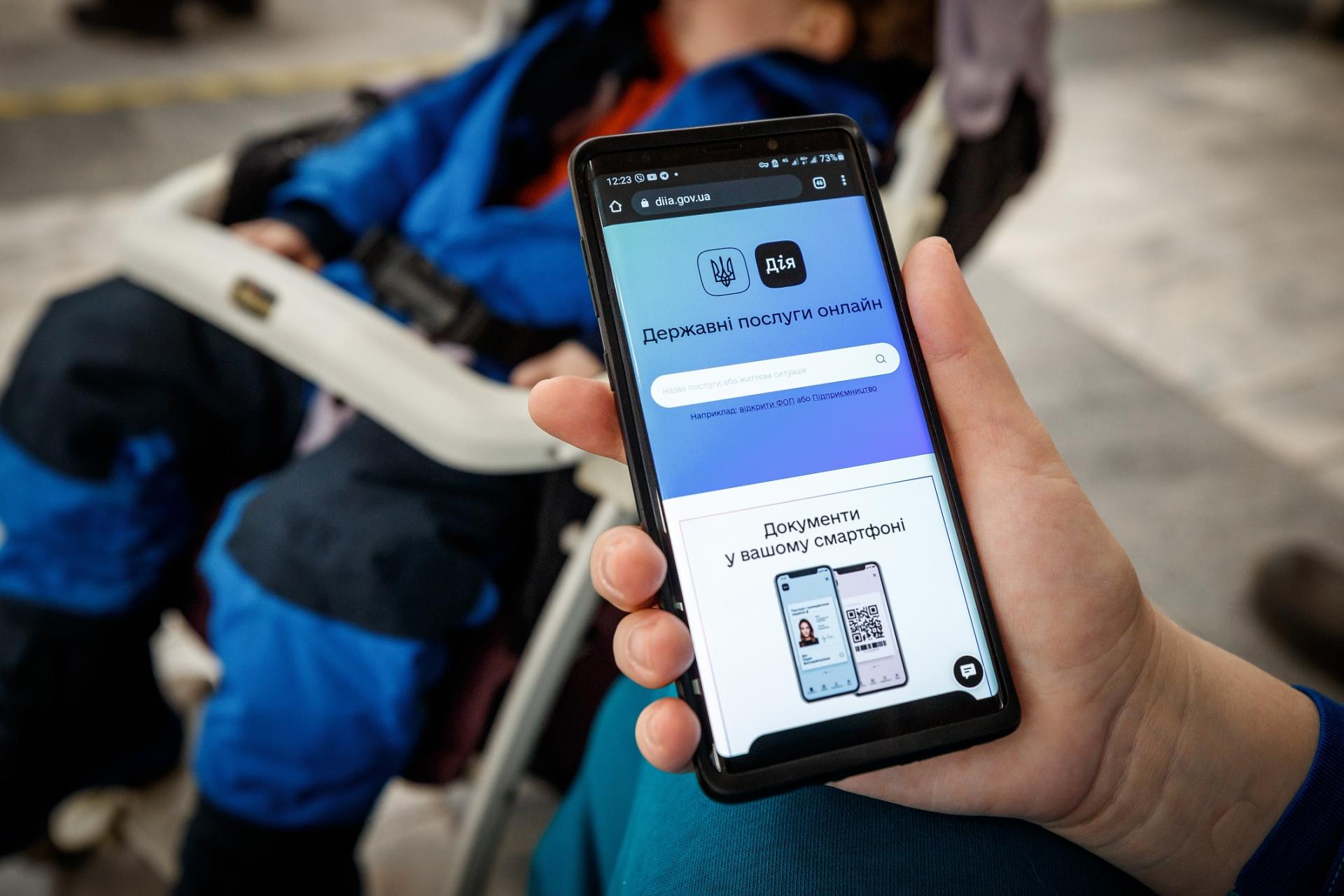How a mobile app to support displaced families in Ukraine is providing a lifeline through the chaos of war
A digital lifeline for Ukrainians on the move
May 25, 2022

A comprehensive government led system of online services developed before the war is now providing Ukrainians a lifeline in times of crisis.
How do you register for official support and humanitarian assistance when war forces you away from your home? When you have fled with just the essentials, without knowing where you are going or how long you will be there. When going to a public office in a town you’ve never visited before to register for that support is daunting or impossible?
The war has caused the fastest forced population movement since the Second World War. Nearly one-third of the population of Ukraine – more than 14 million people – have now fled their homes seeking safe haven inside the country or abroad. Of this total, over 6 million Ukrainians have crossed the borders and are living as refugees abroad, while over 8 million are internally displaced within the country.
Let’s take a moment to consider what this experience entails. It means millions of people – men and women, children, the elderly, people with disabilities – all leaving the communities they considered home to travel to the unknown across the country in search of safety and security for their families. In such moments of extreme distress, there is no time for bureaucracy or red tape; no energy to go through a complicated system.
Fortunately, a comprehensive government led system of online services developed before the war is now providing Ukrainians a lifeline in times of crisis. The service, known locally as Diia (meaning “Action” in English), is fully automated. The platform was launched in 2020 to enable Ukrainian citizens to use digital documents in their smartphones and access more than 80 governmental services. The design of some of these digital solutions was supported by the United Nations Development Programme (UNDP) with financial support from Sweden.
The Diia platform was also developed to enable the Government to reach its citizens in the most remote areas of the country, and those with disabilities, helping to ensure that no one is left behind. Unbeknownst at the time, the effort also created a functioning digital framework that proved useful in keeping track of Ukrainians fleeing war-affected areas and helping them get access to critical public services while displaced.
Not long after the war began, the Government of Ukraine, through the Ministry of Digital Transformation and the Ministry of Social Policy, used this same application to reach out to Ukrainians who were displaced from their homes. In its first few weeks of operation, nearly half a million people self-registered as internally displaced and accessed the online services to receive cash transfers and other forms of assistance.
This digital solution both registers and tracks where people are and what situation they are in. It also allows them to directly apply for monthly cash assistance from the state to address the humanitarian needs of their families. Providing quick and easy access to multi-purpose cash, wherever displaced people may be in the country, is one of the most important forms of aid there is. It can literally save lives, alleviate the burden of displacement and certainly address the basic needs of families so they are better able to live in dignity. We know from experience that in times of war, conflict and crisis, people need to be able to set their own priorities depending on how they have been affected – some may need to buy basic food or get financial help to find a safe place to stay, while others may need money for mobile phone cards to apply for jobs in their new host communities. Cash assistance helps people meet their basic essential needs and more.

The Diia app enables Ukrainian citizens to access more than 80 governmental services through their smartphones.
Adapting the Diia service to the new reality and the needs of internally displaced people (IDPs) in the middle of a war was a considerable challenge, made possible because of the Ukraine government’s longstanding commitment to digitize its public services. The range of e-services available has continued to scale up during the war. UNDP’s in-country team relied on its development investment to simultaneously work as part of the UN family, helping to meet the immediate humanitarian needs on the ground.
Next digital steps
The digital service to aid IDPs exemplifies UNDP’s decades long commitment to Ukraine, our comprehensive efforts to strengthen the government’s ability to deliver services to the most vulnerable, and to effectively respond to a crisis in real time. We have also supported the technical development of a new platform which collects requests from Ukrainians and matches these with organizations who can help. After two months of its launch online, more than 200,000 people had visited the site and benefitted from its services. Other projects already developed include a new information system to collect information from humanitarian aid centres across the country to help central and local governments distribute aid, exactly where and when it is needed.
Reaching all Ukrainians is a top priority for the Government of Ukraine, which continues to function at all levels. Aside from caring for the needs of its citizens, the Government is the main driving force for the recovery and development planning of the country, even in the midst of the war. In recent meetings between UNDP teams and the Minister of Social Policy Maryna Lazebna and Deputy Minister of Digital Transformation Valeria Ionan, we discussed the emerging needs and how digital services could be expanded even further. For instance, aside from tracking and caring for the IDPs, the Government is urgently exploring ways to also reach and support those who have stayed in their homes in war-affected areas and are still operating their businesses. This initiative is part of a widespread effort to best serve small and medium size enterprises and keep the economy running. SMEs in Ukraine were a dominant social and economic power before the war, providing jobs to the vast majority of employees and account for more than half of country’s production output (according to the OECD, they accounted for nearly 81 percent of the labour force and generated 65 percent of total sales in 2020).
We know that digital solutions have a critical role to play in development. All across the world, UNDP is supporting governments and communities to develop and use digital technology to create a wide range of much-needed development solutions. In the space of just one year, UNDP assisted 82 countries to adopt over 580 digital solutions in response to the COVID-19 pandemic. We will bring this collective experience to bear to support the best possible outcome for the people and Government of Ukraine. But first, peace needs to prevail so the country begins the process of full-fledged recovery and reconstruction.
The Government’s capacity to respond to Ukrainian needs during war is a stark reminder that investing in development, reform and public administration is critical parameter of crisis governance. Because having the systems in place, the technical know-how in state departments, and the ability to scale up quickly; is how we can ensure people get the right help, in the right place, at the right time.
The millions of people currently on the move in and out of Ukraine and in war zones across the world, for whom the unimaginable has become reality, deserve nothing less. And Ukraine’s Diia’s experience can now be shared with the rest of the world for learning and replication.
'The digital service to aid IDPs exemplifies UNDP’s decades long commitment to Ukraine, our comprehensive efforts to strengthen the government’s ability to deliver services to the most vulnerable.'

 Locations
Locations
